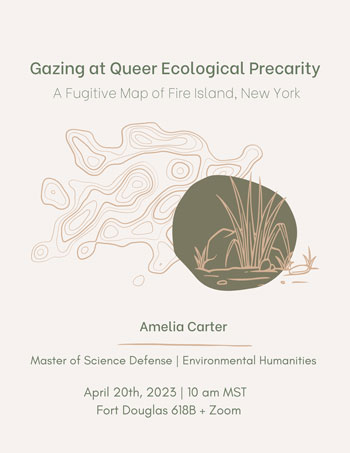Congrats, Class of 2023!
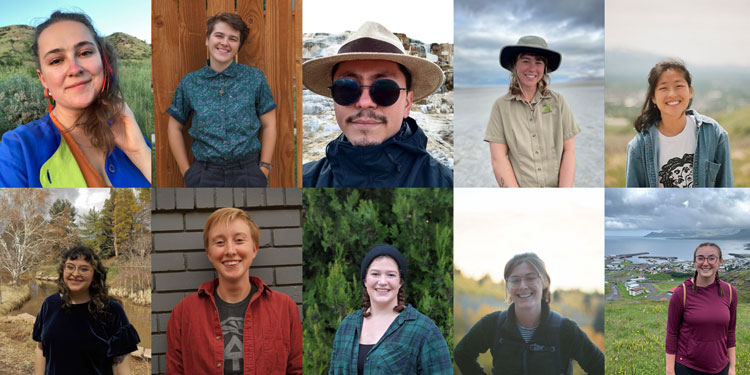
Ten of our students successfully defended their Master's theses and projects this Spring '23 semester and graduated on May 5! It has been a joy to celebrate their accomplishments and watch them succeed. Below are summaries of their final work in our program.
Gazing at Queer Ecological Precarity: A Fugitive Map of Fire Island, New York
By Amelia Carter
Amelia's thesis examines the confluence of class, climate, and colonialism on Fire Island, a historically LGBTQ-friendly barrier island approx. 40 miles east of America's largest city. By examining private property regimes and National Park Service place-making projects along the Seashore, she (de)constructs Queer Ecology upon shifting beach sands. After graduating, Amelia is moving to Philadelphia to pursue her PhD at the University of Pennsylvania in the Department of History and Sociology of Science. Originally from Western New York, Amelia received her BA in Media Studies, Art History and Film from SUNY Purchase in 2018.
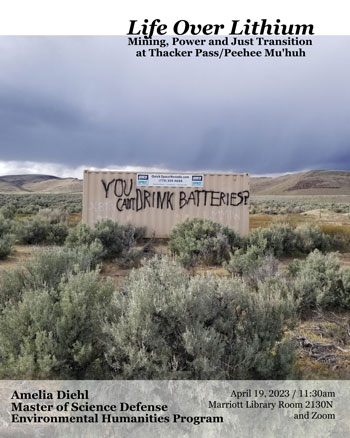 Life Over Lithium: Mining, Power and Just Transition at Thacker Pass/Peehee Mu'huh
Life Over Lithium: Mining, Power and Just Transition at Thacker Pass/Peehee Mu'huh
By Amelia Diehl
Prompted by the climate crisis, the US is transitioning away from fossil fuels to a "clean energy" economy--but these technologies rely on extracting more "critical minerals" such as lithium, a key element for rechargeable batteries. The Thacker Pass lithium mine in Nevada is among the first such mines in the US, developed to build the batteries of electric vehicles--but is being opposed by Indigenous and environmental groups as a false solution to climate change. This environmental and energy humanities project aims to provide an account of the main rhetorical themes of support and opposition of the mine, as a case study pointing to the ways the meanings of the current energy transition are being actively contested.
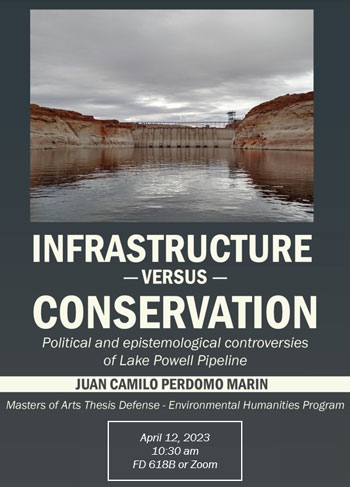 Infrastructure Versus Conservation: Political and epistemological controversies of
Lake Powell Pipeline
Infrastructure Versus Conservation: Political and epistemological controversies of
Lake Powell Pipeline
By Juan Camilo Perdomo Marin
In his thesis research, Camilo studies the diverse responses to the water crisis in Utah, focusing on the public debate whether the state should pursue major engineering works or conservation strategies as far as ensuring adequate water supplies for communities such as St. George. His interest is to analyze what factors influence and shape the arguments for and against the construction of the Lake Powell Pipeline. To address this case, he examines the historical conditions, conflicting data and political interests that affect its divergent perspectives. By considering these controversies as epistemological issues, it will be possible to reflect on the influence of social factors in water measurements and the selection of climate change risk scenarios.
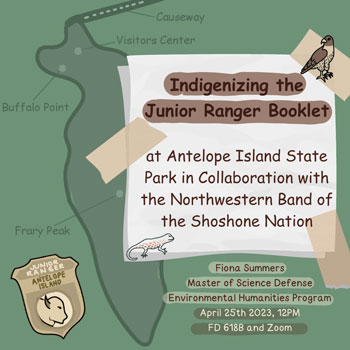 Indigenizing the Junior Ranger Booklet at Antelope Island State Park in Collaboration
with the Northwestern Band of the Shoshone Nation
Indigenizing the Junior Ranger Booklet at Antelope Island State Park in Collaboration
with the Northwestern Band of the Shoshone Nation
By Fiona Summers
The creation of and education about protected areas, such as state parks, often reinforce settler colonial objectives and continue to negatively impact Indigenous peoples and Nations. To address such injustices, this project incorporates theoretical frameworks such as decolonization, land as knowledge, and Indigenous research methodologies to inform collaboration between Antelope Island State Park and the Northwestern Band of the Shoshone Nation. Together, Fiona Summers and her partners created a junior ranger booklet to educate visitors, mainly children, about the cultural and ecological significance of this place through the lens of the Shoshone people. Throughout the project, Fiona investigates the scholarship surrounding the relationships between protected areas in the United States and Indigenous peoples and place-based education. She also describes how theoretical frameworks such as decolonization and Indigenous knowledge of land are utilized in this project to center Shoshone voices and perspectives in the junior ranger booklet.
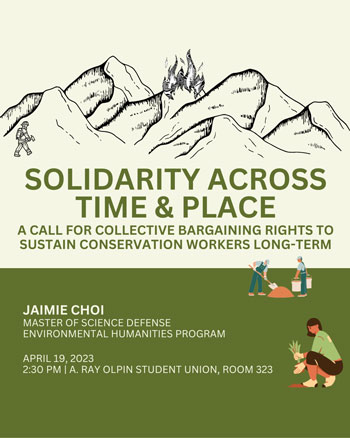 Solidarity Across Time & Place: A Call for Collective Bargaining Rights to Sustain
Conservation Workers Long-Term
Solidarity Across Time & Place: A Call for Collective Bargaining Rights to Sustain
Conservation Workers Long-Term
By Jaimie Choi
Jaimie's project seeks to empower conservation workers and help them realize their power as laborers by turning to history, listening to workers' experiences and complaints, and calling on environmental stakeholders (politicians, donors, and conservation directors) to grant conservation workers collective bargaining rights. Her research centers the lived experiences of workers in the conservation corps to reveal how working conditions and social dynamics have changed (or not) since the creation of the Civilian Conservation Corps in the 1930s. She aims to connect these narratives to broader issues in the field of conservation and make a case for unionization as a way to sustain the environmental labor force.
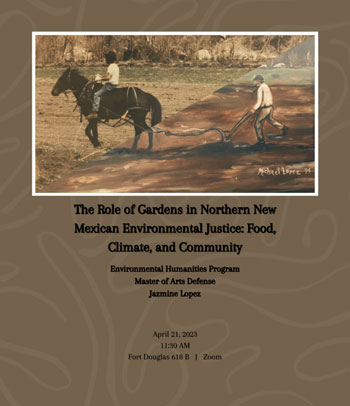 The Role of Gardens in Northern New Mexican Environmental Justice: Food, Climate,
and Community
The Role of Gardens in Northern New Mexican Environmental Justice: Food, Climate,
and Community
By Jazmine Lopez
Jazmine's project merges creative nonfiction and historical analysis to tell a story about the role of gardening in Northern New Mexico's environment and culture, interweaving her strong ties to land, traditions, food, and community in the region. Her project compares community gardens run by organizations for the purpose of feeding marginalized communities and traditional community agricultural practices that have existed for centuries. The project focuses on the Healing Foods Oasis community garden as a case study and story of hope in Española, New Mexico situated within a larger discussion of environmental justice and climate change in the region.
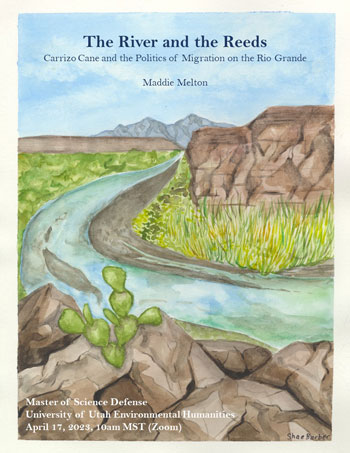 The River and the Reeds: Carrizo Cane and the Politics of Migration on the Rio Grande
The River and the Reeds: Carrizo Cane and the Politics of Migration on the Rio Grande
By Maddie Melton
Carrizo Cane is considered an invasive species in riparian zones across the southern half of the United States. However, on the 1,200-mile Rio Grande river border between the United States and Mexico, narratives of invasion and approaches to cane management intersect with border surveillance and security strategies. Maddie’s project explores the history of border infrastructure and policing on the Rio Grande alongside the intersections of contemporary political and environmental concerns about Carrizo Cane's role in this border ecosystem. Through this, Maddie hopes to contribute to a conversation about the complex role that local environment has to play in the physical, political, and psychological construction and maintenance of international boundaries.
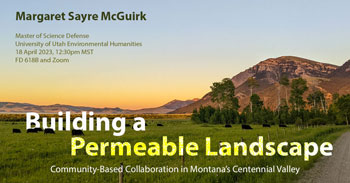 Building a Permeable Landscape: Community-Based Collaboration in Montana's Centennial
Valley
Building a Permeable Landscape: Community-Based Collaboration in Montana's Centennial
Valley
By Margaret Sayre McGuirk
Montana's Centennial Valley sits at the crossroads of the Old West and the New. This narrow, sparsely populated valley holds a National Wildlife Refuge, the University of Utah's Taft-Nicholson Center, a Nature Conservancy field station, ultra-wealthy new landowners, and fifth generation ranches. While the Centennial seems primed to be a hotbed of conflict between increasingly polarized value systems of environmentalism and ranching, residents are instead finding ways to break down boundaries, working toward mutual interests of building a sustainable future for ranching, community, and wildlife in the Centennial. Through an examination of the Red Rock Lakes National Wildlife Refuge and Centennial Valley Association, Margaret's project traces the successes and weaknesses of community-based collaborative conservation in the Centennial Valley as a case study of strategies for overcoming the ideological divides facing the rapidly changing Intermountain West.
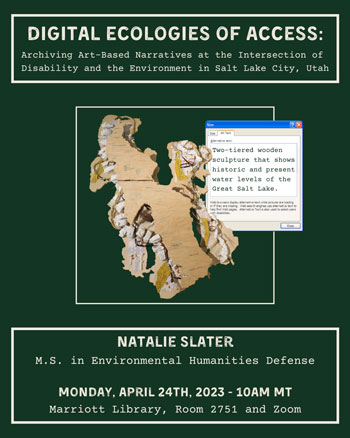 Digital Ecologies of Access: Archiving Art-Based Narrative at the Intersection of
Disability and the Environment in Salt Lake City, Utah
Digital Ecologies of Access: Archiving Art-Based Narrative at the Intersection of
Disability and the Environment in Salt Lake City, Utah
By Natalie Slater
As part of her Mellon Community Engagement Fellowship, Natalie partnered with Art Access, a nonprofit increasing creative opportunities for disabled artists in the Salt Lake region. Together, they founded Embodied Ecologies, a collaborative program for artists making work about disability, health, and the environment. The twelve artists displayed their work in two in-person art installations in fall 2022. Then, during a Digital Matters Graduate Fellowship, Natalie created a digital exhibit that communicates and preserves the narratives expressed throughout the Embodied Ecologies project. Drawing on the field of Critical Access Studies, the digital exhibit moves beyond compliance to a justice-based approach to web accessibility.
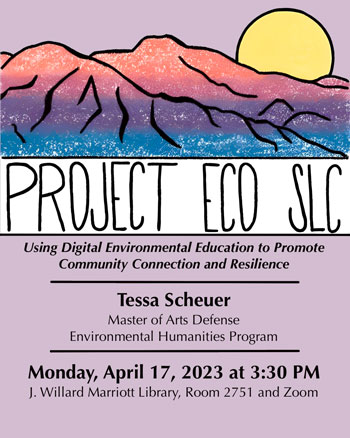 Project Eco SLC: Using Digital Environmental Education to Promote Community Connection
and Resilience
Project Eco SLC: Using Digital Environmental Education to Promote Community Connection
and Resilience
By Tessa Scheuer
Project Eco SLC is a resource to help adults in Salt Lake Valley feel more empowered in the face of climate issues. During the course of a week, readers learn about climate issues facing Salt Lake, learn some useful skills, find local organizations working on the issue, and spend time outdoors reflecting on the ways that we fit into the environment. This database of lessons is meant to help the average Salt Lake City adult better understand climate change at a personal, local level and help them feel more resilient through the process of learning.
Categories
Featured Posts
Tag Cloud
- community engagement (12)
- outdoor recreation (2)
- outreach (1)
- alumni (3)
- admissions (1)
- faculty (8)
- practitioner-in-residence (2)
- cultural anthropology (1)
- utah award in the environmental humanities (1)
- environmental justice (2)
- STEMCAP (2)
- STEM (2)
- water (1)
- communications (2)
- humanities (1)
- Taft-Nicholson Center (1)
- director (3)
- student (5)
- API (1)
- Asian American (1)
- Pacific Islander (1)
- graduation (1)
- research (3)
- thesis (1)
- project (1)
- Indigenous (1)
- Shoshone (1)
- Great Salt Lake (2)
- Bear River (1)
- land acknowledgement (1)
- STEMAP (1)
- public engagement (1)
- science (1)
- science communication (1)
- Wilkes Center (1)
- climate change (1)
- climate science (1)
- climate policy (1)
- policymaking (1)
- funding (1)
- storytelling (1)
- radio (1)
- journalism (1)
- racial justice (1)
- outdoor education (1)
- writing (1)
- non-fiction (1)
- energy extraction (1)
- reading (1)
- environmental education (1)
- affect theory (1)
- media (1)
- rhetoric (1)

